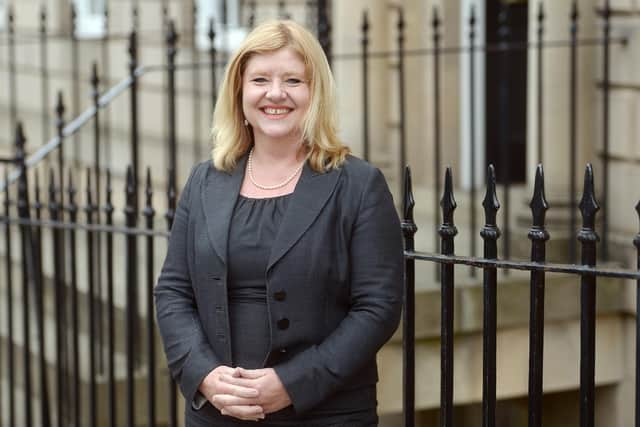Is enough being done to help Scotland's women entrepreneurs withstand the impact of the pandemic?


But will such calls be heeded?
Such female-led firms were in fact found to be twice as likely to be adversely affected as a result of the lockdown, according to the Resilience and Recovery report from the Female Founders Forum – a project by think tank The Entrepreneurs Network, in partnership with Barclays. It comes after the news that in Scotland, women-led employer businesses had already dropped 6 percentage points to 15.5 per cent of the business base before the pandemic.
The Resilience and Recovery report, which harnessed data from Beauhurst’s Covid-19 Business Impact Tracker, cited four main factors causing the disproportionate impact to female-founded businesses.


These comprised:
Advertisement
Hide AdAdvertisement
Hide AdWomen seeing an increase in unpaid work at home during the pandemic - doing two-thirds more childcare than men. Additionally, mothers worked 70 per cent of the hours fathers did, down from 80 per cent before the pandemic.
Additionally, women are more likely to work in industries hit the hardest by the pandemic, such as retail, and hospitality and leisure. The report also noted that female-founded businesses are less likely to be based around tech or intellectual property (28 per cent and 33 per cent respectively for all equity-funded start-ups), which have been most likely to find opportunities for growth as a result of the pandemic.
The report also cited the continued equity funding gap, with just 13 per cent of total equity investment in 2020 going to female-founded start-ups, “and when it did, it tended to be for smaller amounts”. It also said women are less likely to seek external finance to bolster their cash flows. “However once female-founded businesses have received an initial investment, they are just as likely to raise additional rounds of funding compared to non-female-founded firms.”
The importance of and issues around female entrepreneurs raising funding is a longstanding passion of Jackie Waring, chief executive of all-female business angel group Investing Women – which has just launched the programme for next year’s AccelerateHer Awards.
She told The Scotsman that there are various issues that organisations like Investing Women are working hard to address, not least the fact that about 90 per cent of investors are male.
“While we are seeing rising levels of financing going into female-founded companies, we are unlikely to see this change dramatically until we can significantly increase the numbers of female investors.
“We’ve seen this phenomenon in the US where females now account for more than 25 per cent of its business angel investment community,” she added, stating that a corresponding percentage of angel-backed companies are led by a woman.
She also cited studies from groups like First Round Capital, which found that companies with female founders are generating maximum value from the finance they secure. “In effect, they’re achieving more with less investment,” Waring added.
Advertisement
Hide AdAdvertisement
Hide AdAlso commenting on the Resilience and Recovery report was Lynne Cadenhead, chair of Women’s Enterprise Scotland (WES), which notes that women-owned businesses comprise a fifth of those based north of the Border. Wes is part of the Women's Enterprise Policy Group that last month warned that women face a “tsunami” of job losses and business closures without developing enterprise policy that is “productive and fair” for women.
Cadenhead, herself a serial entrepreneur, told The Scotsman that the latest research from The Entrepreneurs’ Network “lays bare the disproportionate impact which the Covid-19 pandemic has had on female-founded businesses”.
Unlocking potential
She also pointed out that for every £1 of venture capital investment in the UK, all-female founder teams get less than 1p. “Until we address the gender gap in enterprise and tackle the unconscious bias which is holding women-led businesses back, we fail to unlock women’s full economic potential. That’s why WES will continue to call for the creation of a National Women’s Business Centre and for an innovative, forward thinking investment fund specifically for women entrepreneurs.” WES said when launching its own online Women’s Business Centre that mothers are 47 per cent more likely to have permanently lost their job or quit since the start of the crisis.
The latest report also follows Converge, which is billed as Scotland’s largest company-creation programme for the higher education sector, seeing female-led firms sweep the board at its awards this year, and a prize dedicated to female entrepreneurs – but it also saw the total number of female applicants fall to 35 per cent from 49 per cent in 2019.
The Resilience and Recovery report did also point out that the number of female-founded businesses who have suffered major disruption to operations – such as closures in premises or delayed product launch – has fallen “dramatically,” with more than 60 per cent “now operating with minimal disruption to their business”. And it added that more than 80 per cent of businesses to receive financing through the UK government’s Future Fund scheme, aimed at UK start-ups, have all-female or mixed-leadership teams.
Barclays said it has pledged to help 100,000 women start and run their businesses over the next three years to help female-led firms continue to recover from the pandemic and tackle the gender gap in entrepreneurship equivalent to an economic shortfall of £250 billion.
Juliet Rogan, Barclays’ head of high growth and entrepreneurs, said: “Whilst great strides have been made for female entrepreneurs in recent years, we know there is still some way to go to level the playing field. As a proud founding signatory of the HM Treasury Investing in Women Code, we hope that our latest commitment... will empower more women to follow their business ambitions and give a boost to entrepreneurship in the UK.
“It’s absolutely critical to the economic recovery that we tap into female-led business potential, and drive forward the UK as one of the best places to be a female entrepreneur.”
A message from the Editor:
Thank you for reading this story on our website. While I have your attention, I also have an important request to make of you.
The dramatic events of 2020 are having a major impact on many of our advertisers - and consequently the revenue we receive. We are now more reliant than ever on you taking out a digital subscription to support our journalism.
Subscribe to scotsman.com and enjoy unlimited access to Scottish news and information online and on our app. Visit https://www.scotsman.com/subscriptions now to sign up. By supporting us, we are able to support you in providing trusted, fact-checked content for this website.
Joy Yates
Editorial Director
Comments
Want to join the conversation? Please or to comment on this article.